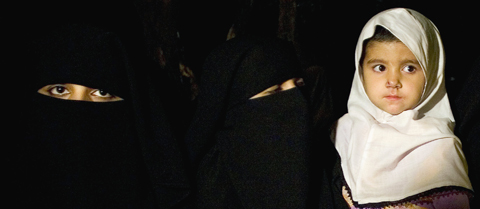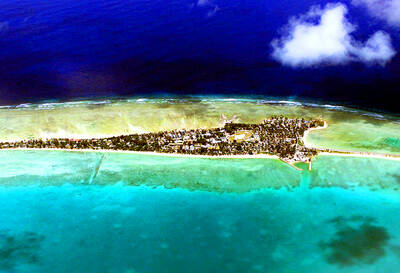A radical Pakistani cleric was released from detention on Thursday and given a hero’s welcome at his mosque, declaring that those killed there in an army assault nearly two years ago did not die in vain.
The release of the former chief cleric of Islamabad’s Red Mosque, Abdul Aziz, will be welcomed by militants throughout Pakistan and took place days after the government effectively ceded control of a northwestern valley to militants to end violence.
“The struggle for the enforcement of Islamic law in Pakistan will continue,” Aziz told hundreds of cheering supports after they carried him aloft into the mosque.

PHOTO: AP
“The sacrifices of the martyrs of the Red Mosque and Jamia Hafsa will not be in vain,” he said, referring to a women’s religious school, or madrasah, in the mosque complex.
More than 100 people were killed when commandos stormed the complex after a week-long standoff in July 2007, leading to a surge in militant attacks that has intensified in recent months.
The violence and spread of Taliban influence are reviving concerns about the stability of nuclear-armed Pakistan, an important US ally vital to efforts to stabilize neighboring Afghanistan.
On Wednesday, the Supreme Court ordered Aziz’s release on 200,000 rupees (US$2,500) bail. His lawyer said 27 cases had been filed against him and bail had been granted earlier in 25 of them while one case had been dropped.
The Red Mosque had for years been a militant hub in the heart of the capital with links to Pakistani Taliban strongholds in the northwest near the Afghan border.
Aziz was well known for his radical sermons, even calling for suicide attacks in the interests of his vision of Islam.
“Jihad, jihad,” shouted his supporters, including hundreds of young women, as Aziz, wearing a turban and with a long gray beard, arrived at the mosque on Thursday evening.
Aziz was caught trying to slip out of the mosque dressed in a woman’s burqa during the 2007 standoff with security forces, days before the commando assault. His brother, Abdul Rashid Ghazi, also a cleric at the mosque, was killed in the assault.
The army finally moved in to clear out the gunmen in the complex after a series of increasingly defiant actions by the clerics’ followers, including the kidnapping of police and of Chinese women they accused of prostitution.
After troops seized the complex they found a large cache of weapons, including machine guns, rocket-propelled grenades, AK-47 rifles, landmines and hand grenades.
Al-Qaeda leader Osama bin Laden’s deputy, Ayman al Zawahri, called for revenge for the assault.
The government has struggled to come up with an effective strategy to deal with militancy, alternating in different areas between military offensives and peace deals.
But the militants have only gained strength.
Pakistani President Asif Ali Zardari, under pressure from conservatives, signed a regulation on Monday imposing Islamic Shariah law in the Swat Valley to end Taliban violence there.
The strategy of appeasement has alarmed US officials, while critics say the government has demonstrated a lack of capacity and will to fight the Taliban and al-Qaeda.
“The Taliban are taking Swat back to the Dark Ages and the Pakistani government is now complicit in their horrific abuses,” Human Rights Watch said.

DISASTER: The Bangladesh Meteorological Department recorded a magnitude 5.7 and tremors reached as far as Kolkata, India, more than 300km away from the epicenter A powerful earthquake struck Bangladesh yesterday outside the crowded capital, Dhaka, killing at least five people and injuring about a hundred, the government said. The magnitude 5.5 quake struck at 10:38am near Narsingdi, Bangladesh, about 33km from Dhaka, the US Geological Survey (USGS) said. The earthquake sparked fear and chaos with many in the Muslim-majority nation of 170 million people at home on their day off. AFP reporters in Dhaka said they saw people weeping in the streets while others appeared shocked. Bangladesh Interim Leader Muhammad Yunus expressed his “deep shock and sorrow over the news of casualties in various districts.” At least five people,

ON THE LAM: The Brazilian Supreme Court said that the former president tried to burn his ankle monitor off as part of an attempt to orchestrate his escape from Brazil Former Brazilian president Jair Bolsonaro — under house arrest while he appeals a conviction for a foiled coup attempt — was taken into custody on Saturday after the Brazilian Supreme Court deemed him a high flight risk. The court said the far-right firebrand — who was sentenced to 27 years in prison over a scheme to stop Brazilian President Luiz Inacio Lula da Silva from taking office after the 2022 elections — had attempted to disable his ankle monitor to flee. Supreme Court judge Alexandre de Moraes said Bolsonaro’s detention was a preventive measure as final appeals play out. In a video made

It is one of the world’s most famous unsolved codes whose answer could sell for a fortune — but two US friends say they have already found the secret hidden by Kryptos. The S-shaped copper sculpture has baffled cryptography enthusiasts since its 1990 installation on the grounds of the CIA headquarters in Virginia, with three of its four messages deciphered so far. Yet K4, the final passage, has kept codebreakers scratching their heads. Sculptor Jim Sanborn, 80, has been so overwhelmed by guesses that he started charging US$50 for each response. Sanborn in August announced he would auction the 97-character solution to K4

SHOW OF FORCE: The US has held nine multilateral drills near Guam in the past four months, which Australia said was important to deter coercion in the region Five Chinese research vessels, including ships used for space and missile tracking and underwater mapping, were active in the northwest Pacific last month, as the US stepped up military exercises, data compiled by a Guam-based group shows. Rapid militarization in the northern Pacific gets insufficient attention, the Pacific Center for Island Security said, adding that it makes island populations a potential target in any great-power conflict. “If you look at the number of US and bilateral and multilateral exercises, there is a lot of activity,” Leland Bettis, the director of the group that seeks to flag regional security risks, said in an